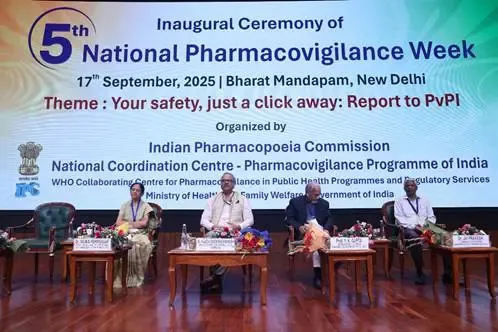How Can Patients Strengthen Pharmacovigilance Efforts?

Synopsis
Key Takeaways
- Patient involvement is essential for effective pharmacovigilance.
- The National Pharmacovigilance Week promotes awareness of adverse drug reactions.
- Innovative digital platforms facilitate easy reporting.
- A culture of curiosity is needed for better healthcare outcomes.
- New initiatives aim to enhance public understanding.
New Delhi, Sep 17 (NationPress) In a significant address, Dr. Rajeev Singh Raghuvanshi, the Drugs Controller General of India (DCGI), emphasized the crucial role of patients in enhancing pharmacovigilance during a recent event on Wednesday.
At the 5th National Pharmacovigilance Week held at the Bharat Mandapam Convention Centre, he underscored how important pharmacovigilance is in protecting patient health.
This year's National Pharmacovigilance Week, which was inaugurated by the Indian Pharmacopoeia Commission (IPC)—the National Coordination Centre for the Pharmacovigilance Programme of India (NCC-PvPI)—is being celebrated from September 17-23, under the theme “Your Safety, Just a Click Away: Report to PvPI.”
The week-long initiative seeks to engage healthcare professionals, regulators, researchers, and the general public in actively reporting adverse drug reactions (ADRs) using user-friendly digital platforms.
“Historically, most reports have originated from healthcare professionals, but real progress can only be made when patients are involved in the reporting process,” Raghuvanshi stated.
He added, “With our reporting efforts, we have positioned ourselves among the leading global contributors in documenting adverse events.”
Raghuvanshi also pointed out that, although abundant data is available for analysis, its effective use in bolstering pharmacovigilance remains insufficient.
Moreover, he mentioned that “the focus of pharmacovigilance must evolve as the context within the country has changed. We have now established a solid foundation for pharmacovigilance, with policies being formulated and enforced.”
“A culture of curiosity is essential within organizations, rather than one of fear, to achieve better outcomes. We need to smartly integrate technology and innovative strategies to foster different ways of thinking,” Raghuvanshi remarked.
On this occasion, the IPC introduced a variety of new initiatives, including a short film on PvPI, a pharmacovigilance comic available in several vernacular languages to boost public understanding, and a new online reporting platform that can be easily accessed via a QR code.










